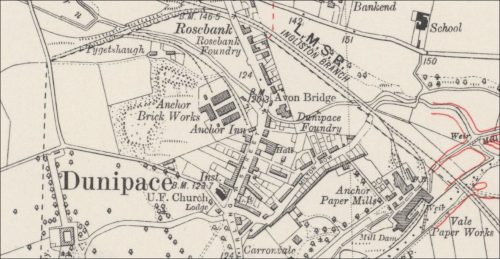Canmore
- Stein, Castlecary Fireclay Works, Castlecary, Stirlingshire.
- Stein, Manuel Firebrick and Refractory Works, Whitecross, Stirlingshire.
- Stein & Co, Anchor Brickworks, Denny, Stirlingshire.
- Milnquarter Fireclay & Gannister Works, Bonnybridge, Stirlingshire.
Below – Source Falkirk Archives. Established in 1892. Closed 1932 (Note – SBH – See below as this start date may be wrong)
Anchor Brickworks were opened by JG Stein in 1892 and were situated on ground that formed part of the Callendar Estate, By the early 1930s however, raw materials had been exhausted and the works were forced to close in March 1932.
The closing of these works severed Stein’s connections with the house brick trade. The firm now began to concentrate on the production of refractories, which was rapidly becoming its major interest.
The site is now covered by playing fields at Dunipace, however from old photographs, it would appear that it originally consisted of 3 kilns, 2 chimneys, an engine room and several other small buildings. The kilns were 14, 18 and 22 chambered. In addition, there were 2 pits bings on the site and a railway siding running down the east side of it. Most of the common bricks manufactured from it were produced from blae or pit spoil so the raw materials were obtainable from the 2 pit bings on the site. However, in some cases, the clay did have to be imported. All bricks were machine-made and only building bricks were produced.
The works possessed their own siding which joined the Ingliston Branch Line. On-site, rails also connected the bings to the actual works. In addition, the completed product was also transported by contracted lorries.
The only information available regarding markets indicates that some anchor bricks were used in the construction of the site itself.
The labour force is reputed to have varied between 30 and 100 employees and to have consisted of more women than men. The works had no Union and no sickness or pension schemes.
During the first few decades, wages for the unskilled workers were reported to have been in the region of £1 (per week?)
An annual dance was provided free for all workers.
Associated persons
Mr Forbes – Hendry
Mrs Dean – 13 Maple Place, Dunipace
Mr George Boyd – 200 Stirling Street, Dunipace
Mrs Cain – Dunipace ( sister to Mrs Dean) – ex-employee
Below – 12/12/1896 – Falkirk Herald – Erection of new brickworks (Note SBH – Falkirk Archives state the Anchor Brickworks were started in 1892. This article suggests it was 1896 – 1897. Was there an earlier brickworks that I cannot find?) – Messrs J. G. Stein & Co., of Bonnybridge, have leased the blase field at Dunipace – raised from the old Anchor Ironstone Pit – the property of Messrs William Baird & Co., Limited, Gartsherrie, where they intend erecting machinery capable of turning out 13,000 or 14,000 bricks per day. Yesterday the ground for laying down the plant was inspected by the firm. It is expected that the works will be in operation in the spring.
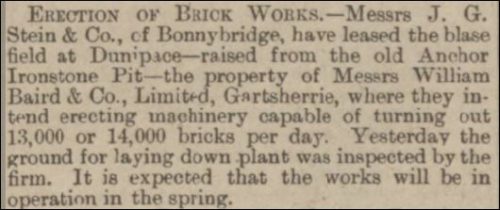
02/1897 – Charles Taylor starts work at the brickworks as an engineer. He stayed with the company for 48 years and spent much of those years as a manager at the Castlecary Works.
21/08/1897 – Falkirk Herald – New Brickworks – A start has been made with the manufacture of bricks at Dunipace. It is expected that about 50 hands will be employed when the works are in full order.
Below – 22/01/1898 – Falkirk Herald – The tramp and the engine, an extraordinary affair – drunk tramp sets the machinery going while men were engaged cleaning it.
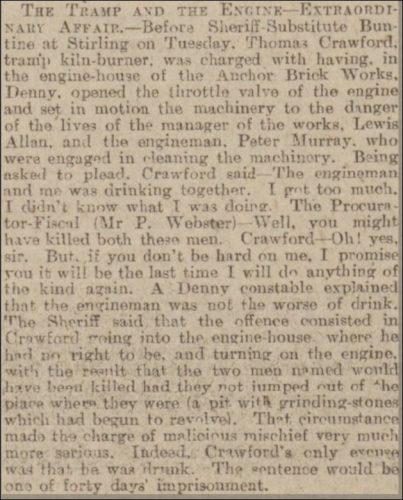
16/02/1899 – Glasgow Herald – Brickburner – First class man for Hoffman Kiln – apply John G Stein & Co, Denny.
20/01/1900 – Falkirk Herald – The brick and fireclay goods trade … With regard to Denny district, in addition to the new works already referred to started by Callendar Coal Company, the extensive brick factory of Messrs Stein and has had to be increased to meet the excessive demand for bricks. This company can boast of an extraordinary measure of success in the manufacture of brick from blaise.
30/01/1900 – Mr Stein takes Rowley and Co, Lincoln to court. Stein had bought steam engines from Rowley and had been promised a reduction in coal usage and an increase in production. The engines were fitted several months behind schedule and thereafter they did not live up to the sales agent’s claims. The court, however, ruled in Rowleys favours much to the very evident displeasure of Mr Stein. – Source Kenneth W. Sanderson.
17/02/1900 – Falkirk Herald – The valuation of Messrs Stein and Co’s Brickworks. At a meeting of the Valuation Committee of the County of Stirling, on 15th September last, John G. Stein & Co. appealed against the assessor’s entry in the roll of their brickworks, Dunipace, as of the value of £200, and craved that the entry should be deleted. By lease dated in November and December 1896, William Baird & Co, let to Stein & Co, a piece of ground occupied to a large extent by a large heap of blaes, which was put out in connection with the working of an ironstone mine. Stein & Co. entered on possession of the subjects let at Martinmas, 1897, and erected kilns, ovens, and other apparatus for grinding, moulding and baking the blaes and turning it out in the form of bricks. It was contended for the appellants that these erections fell within the exception provided by subsection 3 of section 4 the Act of 1895, in respect that they were structures in which minerals (the blaes) were treated, and that the rent or lordship payable under the lease was calculated upon the minerals as so treated —the finished product in the shape of bricks. The Assessor submitted that the material treated in the structures was not a mineral within the meaning of the Act; that the exception was intended to apply not to a substance like blaes, for which, after lying waste for many years, a use had at length been discovered, but to the case of valuable mineral substances, excavated, brought, to the surface, and forthwith treated in the typical instance coal taken direct from the pithead the coking oven; and that consequently, the exception pleaded by the appellants did not apply. The Valuation Committee sustained the appeal and ordered the entry lie expunged from the roll the ground that the erections fell within the exception of the Act. The Assessor was dissatisfied with the determination of the committee and craved a case for the opinion of the Judges. In the Valuation Appeal Court on Wednesday, Lord Stormonth-Darling said he was opinion the determination of the committee was right. The respondents, Stein & Co., were rated in the valuation roll for subjects which amounted to £213, that being the royalty payable by them to the landlords upon certain bricks which they made out of the blaes, which was the subject of the lease. The assessor proposed in addition to that valuation to enter them in the valuation roll for £200 as the value of the brickworks erected for the purpose of carrying their process. That could only be done under the Act of 1895, and the question really came to be whether the structures were exempted from assessment the operation of subsection 3 of section 4. His Lordship was of opinion that they were here dealing with a lease of minerals. As to whether the structures were of the nature contemplated by the sub-section, he did not know a more convenient term to express the nature of the operation than to say that the structures were designed for the purpose of treating the minerals, which in this case happened to be in the form of blaes. The only other requisite to bring these structures under the purview of the subsection was that the rent or lordship should be calculated on the minerals treated in the ovens or other structures. There again his Lordship was of opinion that they must answer the question in the affirmative. That being so, he thought the structures fell within the purview of the subsection. Lord Kyllachy concurred, and the determination of the committee was affirmed.
04/04/1901 – The Scotsman – Curious quarrel about money. At Glasgow Sheriff Court. Reference to Charles Taylor, brickwork manager, Rosebank, Dunipace suing Henry Nisbet, colliery manager, Huntley Terrace, Shettleston for the recovery of money given to him for safekeeping.
04/10/1902? – Falkirk Mail – Article on John Gilchrist Stein … At Denny, where he has a common brickworks there are three Bradley and Craven machines at work and three continuous kilns for the manufacture of common bricks from “blaes bing” or pit spoil bank. Both works are lighted by electricity …
31/01/1903 – Falkirk Herald – Great rainstorm … At the Anchor Brickworks little work could be done through flooding …
Below – 19/08/1903 – Serious accident at Dunipace Brickworks.
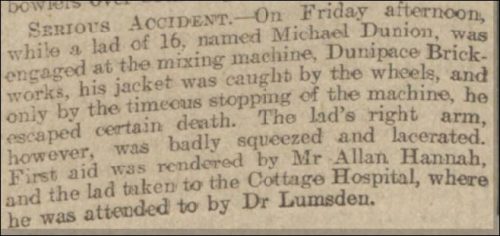
1905 – The company was incorporated as John G Stein and Co.
08/07/1905 – Falkirk Herald – The annual excursion of the Denny Brass Band took place last Saturday to Rothesay. Other parties who took advantage of the band’s trip were … J.G Stein & Co, Dunipace Brickworks and the Callendar Coal Company’s brickworks …
Below – 1913 – Anchor Brickworks, Dunipace. (The brickworks are not detailed on the 1896 map although the Falkirk Archives information above states they were started in 1892?)
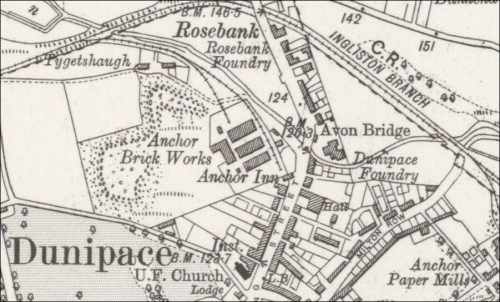
Below – 31/05/1913 – Falkirk Herald – Boy injured while playing with a bogie running from the Blaeshill to the brickwork sheds.
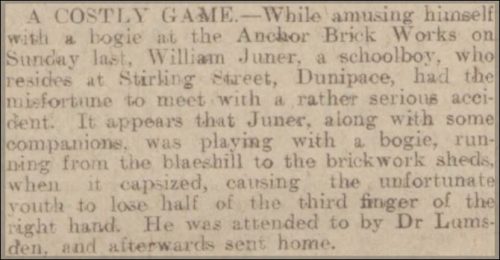
06/05/1922 – Falkirk Herald – Theft of coal – Two young men, named George Smith and W. Comrie, residing in Dunipace were charged at the Burgh Police Court on Monday with stealing 14 lbs. and 36 lbs of coal respectively from Anchor Brickwork, Dunipace, the property of Messrs J. G. Stein and company. Both accused pleaded guilty, and Provost Lochhead, who presided, imposed a fine of 10s on each, with the alternative of five days imprisonment. The fines were paid at the bar.
02/06/1923 – Falkirk Herald – Reference to the theft of coal from the Anchor Brick Works, Dunipace (Messrs J.G Stein and Co Ltd).
05/07/1924 – Falkirk Herald – Girl killed at brickworks – A girl worker, Marie Comrie (18), 258 Stirling Street, Dunipace was the victim of a fatal accident which occurred at the Anchor Brickworks, Dunipace owned by Messrs J G Stein brick manufacturers, about 2 pm yesterday. A large wheel burst through part of the machinery becoming jambed and a piece of flying metal struck her on the forehead and killed her instantly.
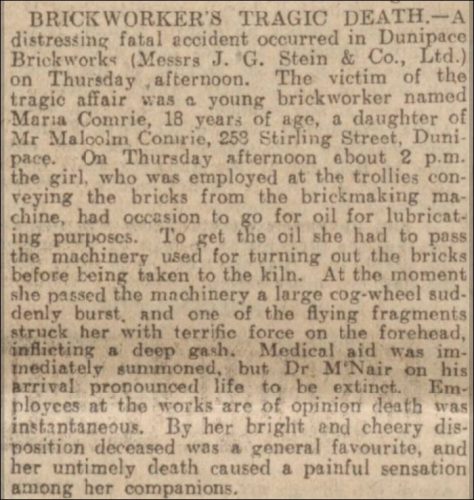
Below – 27/02/1926 – Falkirk Herald – As more briefly reported in our issue of Saturday last, the seventh annual reunion of the directors, staff, and workers of the brick-manufacturing firm of Messrs J. G. Stein. Ltd., Bonnybridge, Castlecary, Denny, and Larbert, took place with marked success in the Public Hall, Bonnybridge, on Friday evening. An assembly of 550 ladies and gentlemen were entertained by the firm to a supper, concert, and dance … the Chairman reminded his hearers that last year had been a very trying year, not only for those in their own industry but for a great many other industries, especially the heavy ones like coal, iron, steel, shipbuilding and engineering on which they depended very largely for the refractory part of their business. Last year at Denny they had been fairly well employed, and while they were left with a fairly good stock at the end of the year, their prospects were quite good. He hoped they would be able to keep the works there going the whole of this year. (Applause.) With regard to firebricks, they had not been fully employed, but they had, nevertheless, got a fairly good share of the work going. In fact, he thought that they had been better employed than most of their competitors. If they would excuse his saying so, he thought they deserved it, because their aim always was to create and maintain a very high standard in every respect. (Applause.) The prospects for this year, speaking generally for the country, and particularly for themselves, seemed to be somewhat brighter. There was not very much actual difference in the demand for refractories in Scotland yet although last week or so there had been reports of quite a number of orders for boats being placed with the Clyde. That would certainly help them in Bonnybridge. In England and Wales, the demand was distinctly better. This was due to the large number of subsidiary trades in England which used up steel. In Scotland, they had very little else but shipbuilding and structural work. These remarks, he went on, were subject to no great industrial trouble developing, such they had had threats of every week from platforms all over the country. Even those very threats drove away a large amount of trade. This fact was shown very clearly just after the subsidy the coal trade was given, and for two months afterwards, their coal exports fell drastically. That was due to foreign buyers having protected themselves against the chance of strike obtaining supplies elsewhere. The mere threat of strike adversely affected all industries, because all were more or less leaning on each other. Proceeding, the Chairman said that some Trade Union leaders held that the cause of so much unemployment, in this country was the failure of Capitalism. If Capitalism was an evil, then it seemed to him to be a very necessary one because they could not carry on any industry without capital, whether the particular industry was carried on by individuals, or by co-operative societies, of which they had a worthy example in Bonnybridge. He himself had been a member of the Bonnybridge Co-operative Society for a quarter of a century; indeed, as long as he had lived in the village of Bonnybridge. The Bonnybridge Society had a first-class record, did good work, and made good beef-steak pies. He was altogether in favour of co-operation, not only as it applied to Bonnybridge, but of co-operation generally, even to the extent of co-operation between workers and employers. Those Communists, whom we called Bolshevists, who lived in that “blessed” land of Russia, were, remarkably enough, always hankering after more capital. While they ran down this country, its interests, its people, and its Trade Union for their being far too tame – although sometimes thought they were far too wild – they were very anxious to get our capital into Russia. Eighty per cent, of the Russian population lived on the land, produced their own food, and did not have very many luxuries. Russia, therefore, had not the same clamant need for capital as a highly industrialised and civilised land such ours. The depression in the heavy trades in this country was due to the high prices asked. As they probably knew, a great many of our trades were carried on without any profit, and some even at a heavy loss. The cooperative societies got their capital from their individual members; local authorities and Governments by rating and loans. He was, as he had always said, strongly in favour of cooperative societies, but he was equally strongly against any work being done by local authorities or the Government that could possibly be done by private enterprise. Whatever might be said for nationalisation, in theory, it absolutely broke down in practice. They could not as a nation afford to take the risk of their main vital industry – coal – being nationalised, when they had so many concrete examples of State management failures before them. He ventured to say that the Coal Commission would not recommend nationalisation, and one reason he had for saying that was that the miners had the outset found themselves bound to admit that, no matter what nationalisation might do for them in the future, it certainly could not meet the crisis which would arise in May. If nationalisation was not the remedy for the persistent unrest, which was an unfortunate feature of these times, what was to be done? Theirs was an acute industrial trouble, and it was their duty as individuals, and it was the duty of their Government, to endeavour to diagnose the cause thereof, and the possible effect of the cure. It could not be denied that the primary cause of the slackness in iron, steel, coal, shipbuilding, and engineering was the fact that they were being undersold by their continental competitors. Wages in this country were about 50 per cent, higher than in France, Germany, Belgium, or Holland. Our handicap was an unfair one. He was not advocating a reduction of wages, but he thought it was the duty of the working men of this country – trade unionists and non-unionists – to tell those loudspeakers who went about the platforms and even mounted orange boxes and tubs, to shout about “the failure of Capitalism,’’ that they should devote their energies and capacities to the problem of raising the standard of living in those countries he had mentioned, and with which we were competing, and so enable manufacturers in this country to compete without their present handicap. If they were once relieved of it, trade of every kind in this country would soon be overflowing. It was well-known that for quality and reliability, our productions excelled everything produced anywhere else in this world. The comparatively low wages on the Continent and the longer hours worked there, had produced one notable result – in France, there were no unemployed. Indeed, there were approximately threequarters of a million foreigners in France, who had gone there to fill the vacancies due to the great demands for her productions, which were much cheaper than ours. A large number of men – chiefly engineers – had gone from this country and got jobs in France. Few Britishers had remained in France in those circumstances, however, because they did not like having to work on Saturday afternoons and Sundays. There was evident also on the Continent a greater willingness to get work done quickly and therefore, more cheaply, by co-operation between masters and men. In French shipbuilding there were only some six trade unions concerned; in this country, there were at least 30; he thought the number was 35. In this country, a lot of squabbling took place, not between employers and individual workers, but between those trade unions, which frequently caused a delay in the construction of ships and engines. He was glad to see that there was a tendency now to improve this state of affairs. By a majority of four to one, the shipbuilding trade unions had agreed to co-operate with employers with a view to reducing costs without reducing wages. Lack of cooperation meant a lack of the friendly feeling which their presence there that evening and their smiling faces showed existed in the business in which they themselves were concerned. (Applause.) At present there were far too, many men in this country making their livelihood creating and fomenting discontent. He had to confess that he cherished ambition to make all his workers “works proud.” He wanted them to feel that they were citizens of no mean city when they were employed by him. He thought they did realise that the past had done something to make their conditions of employment safe and comfortable circumstances permitted. (Applause.) Not only so, but he had the ambition to make their wives who lived in houses belonging to him and those associated with him “houseproud.” He knew that they were already very much so but he wanted to see that feeling intensified. In the works he wanted their jobs to be as interesting as possible, and any suggestion put forward by any worker would have an adequate reward. (Applause.) Concluding, the Chairman said that since they met a year ago they had completed twelve houses which were in course of erection at Allandale. Twenty years ago the then medical officer of health for the county had said that the company’s houses at Allandale at that time were the best workmen’s houses in Stirlingshire. He (the speaker) thought that this latest addition much excelled the others in some respects that having in view the improvements which had taken place in other parts of Stirlingshire, they still held that very high honour. (Applause.) They would proceed with the erection of more houses as soon they had the assurance from the powers that be that they would participate in the building subsidy. (Applause.) …
Below – 23/02/1929 – Falkirk Herald – John G Stein annual social outing.
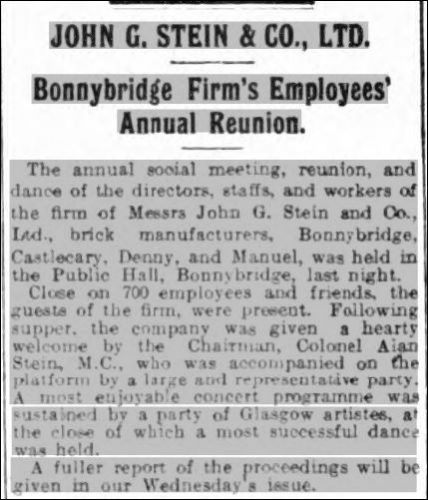
1931 – Anchor Brickworks closed after the bings being worked were exhausted.
Below – 04/04/1931 – Falkirk Herald – Employee’s reunion – Annual gathering of employee’s of Messrs John G Stein & Co – Col Stein and the trade outlook.
Dinner over and the tables cleared, Colonel Stein rose to address the employees, from whom he received a hearty ovation. In his opening words of welcome, he expressed his regret that it had not been possible to have the employees of the Manuel Works present, as the accommodation the hall was already taxed to its utmost. They, however, had a successful social evening of their own in Polmont a week ago. Continuing, the Chairman said:-We are passing through a very depressing time, and while we have been very successful in the past in providing regular work to steadily increasing numbers, we have had to slightly curtail our output during the last six months. Notwithstanding this, we have as many employees as we had last year but since then we have started our new works at Manuel, and but for the depression, our numbers would have been much greater in consequence. I would like to say a few words first on the general situation. We are all naturally much concerned about the serious and persistent unemployment, and it is important to try, if possible, to have a clear idea of the cause. I was once told by a distinguished research worker that a problem well defined is half solved. There are important factors such as the state of affairs in Russia, India and China, and the world depression in trade, but I believe our main problem is that we must get our costs of production reduced. We have failed in this country to adjust our costs to world costs, and we are getting a much smaller share of the export trade in consequence. I have mentioned this before, but “ facts are chiels that winna ding,” and I think this fact becomes more and more apparent as we struggle painfully along. We are handicapped with high wages in many of the sheltered trades. By this, I mean those trades competing for export. The municipal street cleaner gets a higher wage than the skilled engineer. I think, however, there are two principal ways by which we can reduce costs, leaving aside an extension of piecework, for which there appears room, especially in the building trade. First, expenditure of more capital on improved plant and equipment to get greater production per head; second, reduction in rates of wages. The first way, in my opinion, is the desirable method, but apart from lack of confidence in the future, in this country, we are using up our capital in excessive taxation, and it is not available for new equipment and new construction. The provision of new equipment in itself provides considerable employment. For example, we have been spending capital for two years building new works at Manuel, and roughly speaking, gave employment directly or indirectly to 350 men during those two years, and now when complete we are giving regular employment to others. This sort of thing should be done more in all trades, and all the time, and it would be done, I am sure if conditions permitted. Failing reduction in costs on these lines, I think nothing can prevent a fall in wages, although the solution may come partly one way and partly the other. I believe the ultimate interests of both capital and labour run more on parallel lines than is generally believed, and a proper realisation of economic laws would help us to recover more quickly from the present depression. I turn now to our own affairs. I am glad to report there has been an increased attendance at evening classes our employees last winter. Under the scheme whereby we give a bonus to those who complete the course and gain certificates, 18 of our employees earned bonuses totalling £41 4s last winter. The same scale bonus will be given to employees at Manuel in future. I hope there will be a still greater increase in the attendance at evening classes. I need hardly emphasise the importance of good education, and for those who wish to get on in life, it is quite essential that they should make every effort to improve their education. If we are to maintain a higher standard of living than our competitors we must make the fullest use of the brains as well as the brawn! We had a series of technical lectures at Castlecary Works during the winter. There were nine lectures altogether covering chemistry, physics, and clay technology. The average attendance was 35, and I consider this highly satisfactory. These lectures were given by members of our staff, Messrs Hyslop, Biggs and Malcolm, and I believe they are willing to continue in the same way next winter if they find there is a demand from the employees for them. The idea originated with these gentlemen themselves, and I am sure we are much indebted to them for the trouble they have taken, I have been very pleased to note the improvement in the gardens at Castlecary. This is no doubt the result of the garden competition instituted by Miss Annie Stein two years ago. Other various social activities are going along well. The Scouts, under Scoutmaster Muir, are going strong and had a very successful camp at Arran last year. The Sunday School, under Mr Crawford, continues its good work, and we now have a successful juvenile choir under Mr Benson. The Recreation Club is more popular than ever. The Bowling Club have also had a successful season and the winner of the green championship (bowl presented by Mrs John G. Stein) was Mr Robert Clelland. The works football shield was won this year by the stove department. Since our last social meeting the two most important events for us were the starting of our new works at Manuel eleven months ago, and the opening of our new Research Laboratory eight months ago. The new works are turning out excellent bricks, and we are finding steadily increasing demand for them. We are doing our very best to capture markets overseas previously held by foreign competitors. The new research laboratory will help us to keep abreast of the times, and we have an excellent staff there, under Mr Hyslop. The heavy industries of this country have been the most badly hit by the depression, and this affects the demand for firebricks and silica bricks in which we are most interested. We have, however, had a good share of the business that is available. I would like very much to have been able to tell those who are on short time, or were suspended, that there were signs of the tide turning, but I really cannot do so. We have an excellent team spirit throughout our whole organisation, and I am sure that, especially in these times, you will do your very best that we deserve to get more business. I have confidence in the future of this country. I think we have been too slow to appreciate the greater competition we have now to face for a share of the world trade, but we have excellent workmen and I have every confidence that we will sooner or later face the hard facts, and that we will then see a return to prosperity. At the close of his address. Colonel Stein had to wait for the prolonged applause to subside before he could announce the commencement of the concert. The programme was sustained by a party from Messrs Paterson’s musical agency, Glasgow, and it is safe to say that it equalled, if it did not excel, the high standard attained on previous occasions. In his opening number, “The Stockrider’s Song” (W. A. James) Mr Frank Gordon, bass-baritone, caught the mood of this Australian bush song to perfection and fully merited the applause he received from the appreciative audience. Later, in “The Trumpeter” (Airlie Dix), and again in that popular old Cornish folk song “The Floral Dance,” Mr Gordon had full scope for his interpretative powers and established himself in favour from the beginning. In her first solo, “Hungarian Dance” (Drdla) Miss Margaret Smart, violinist, exhibited fine tonal quality and a dexterous bow hand, while in her later numbers, “Two Russian Solk Songs” arranged by Kreisler, and the Weber-Burmester “Waltz,” her technique was admirable, and occasionally when the music demanded, she gave glimpses of clever left-hand work also and proved herself a young artiste of much acceptance and considerable promise. Miss Nettie Sclanders is a young soprano with a fresh unspoiled voice and a useful range. In “The Waltz Song” (Edward German) Miss Sclanders showed clear diction and a sweetness of tone that was in harmony with her charming stage presence. In her later songs, “Ave Maria,” and Eric Coates’ “Bird Songs at Eventide,” this young singer earned whole-hearted applause from her hearers. The “magic” of Mr Claud Williams was at times as mystifying as it was clever, his running patter being a source of continuous merriment, and completing a programme that was thoroughly enjoyed by all present. Miss Barbara Laing at the piano, accompanied the soloists with commendable skill and sympathy. At the conclusion of the concert, Dr Young proposed a vote of thanks to the committee and artistes. He said there had always been two outstanding features connected with the firm of Messrs John G. Stein & Company. The one was the power of organisation, and the other was efficiency. With regard to the former, he asked the employees to accord to the committee who had organised so successful a function, their heartiest thanks. (Applause.) The second outstanding feature was efficiency. They had heard Colonel Stein talking about unemployment and cost of production, and he would like to suggest to Colonel Stein that he should secure the services of Mr Claud Williams, and then he could make bricks out of nothing! (Laughter.) Mr John McConnachie, on behalf of the employees, returned sincere thanks for the generosity of the firm. They were very much indebted, he said, to Colonel Stein for the address he had given them, and also for his resume of the firm’s activities during the past year, which they must consider very satisfactory despite the depression which was so prevalent all over the world. They all hoped and trusted that it would soon pass away and that the firm of John G. Stein & Company would continue to hold the position it had held for many years; that is “second to none.” (Loud applause.) He also asked the audience to accord Mrs John G. Stein a special vote of thanks and to ask their worthy chairman to convey to his respected mother their kindest regards, and the hope that she may long be spared to come amongst them. Mr Norman Stein, although he, unfortunately, could not be with them this evening, was nevertheless an important factor in the firm’s progress, and it gives him pleasure to join his name with those of Colonel Allan and Mrs John G. Stein, He asked them to accord to their employers a very hearty vote of thanks for the excellent way in which they had been entertained tonight. (Prolonged applause.) The call, having received a response, and having been duly acknowledged by Colonel Stein, the first half of the programme came to end. The hall was then cleared for dancing which was carried through to the sprightly music of Mr David Mitchell’s Carron Orchestra, the members of which are to be complimented on their rhythmic melodies and the readiness of their response to encores. The onerous duties of M.C. were jointly and ably fulfilled by Messrs W. Miller, P. Duff and A. Cooper …
17/06/1933 – Falkirk Herald – … A further Dunipace landmark has been removed. The process of demolition at the disused Anchor brickworks reached the stage this week when the two chimney stacks were razed to the ground. The first was brought low at the weekend and the collapse of the second was watched by many of the ‘Pace residents on Tuesday morning. All that remains of the former seat of the industry now is to all intents and purposes only a pile of bricks.
Below – 1938 – The Anchor Brickworks are still shown on the map? (They are not depicted on the 1946 map).
